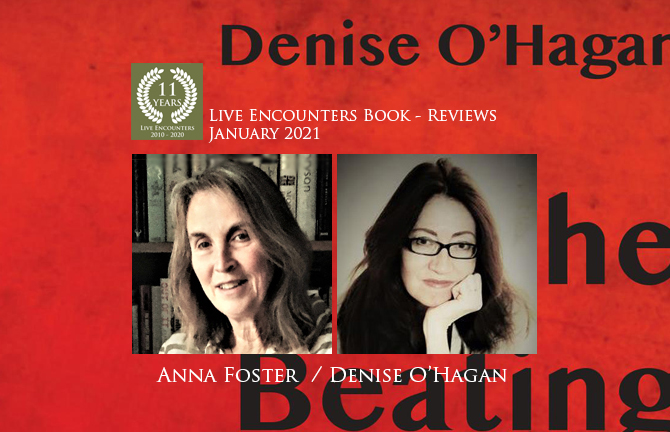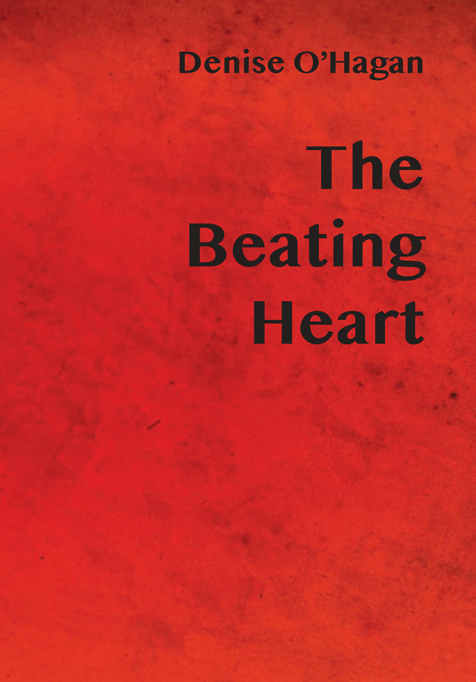
Download PDF Here
 While some of O’Hagan’s poems were written years ago and have only now been brought together in a single volume, many of the truths they tell could only be felt and understood with the experience of age. So, The Beating Heart doesn’t read like a first collection, which makes it all the more remarkable.
While some of O’Hagan’s poems were written years ago and have only now been brought together in a single volume, many of the truths they tell could only be felt and understood with the experience of age. So, The Beating Heart doesn’t read like a first collection, which makes it all the more remarkable.
We travel through the last century from a poem about the poet’s grandmother, who dies tragically young and which is based on a photograph reproduced next to the poem, to another about the poet’s teenage son having cardiac surgery in Boston, Massachusetts and the strength that she draws from a visit to Boston’s Museum of Fine Arts and a painting by Vermeer.
First the grandmother, ‘Recalling Sarah’: this young woman is pictured as ‘a softly sepia’d twenty year old’ in New Zealand in 1920, poised and expectant about her life ahead, yet at the age of 32 she passed away from pulmonary tuberculosis. Her young son (O’Hagan’s father), is brought to see her before she dies, and it is this memory that never leaves him:
‘I think
He never stopped missing you
And the missingness
Was passed down, and down.
And so your photo
Still sits in front of me
A haunting, present absence.’
A grandmother never known, a mother barely known – time cannot heal the loss, but through the photograph the poet is able to reach out and gather together the young life, the son’s farewell, and her own sense of ‘missing’.
Turning to ‘Vermeer in Boston’, this poem is set in 2015 when O’Hagan travelled from Australia to Boston with her poorly son. While he is in the operating theatre, she finds herself in front of Vermeer’s A Lady Writing:
‘My thoughts haywire, clinging
To another imagined room a mere walk away
Where a team of specialists
Pored over our son
Whose opened chest
Was spread like a canvas
For the surgeons to splatter and daub
And create another version
Of his deformed and failing heart:
Their masterpiece.’
In one room, saving a life and in another, observing a life. ‘I met her painted gaze, unflinching,’ writes the poet about the portrait and, as she waits eleven long hours for the call to tell her that her son is in recovery, ‘I didn’t feel alone’. Months later, she sees the portrait in a catalogue:
‘And in one moment
I was back in Boston with her.
Waiting.’
These two poems, each based on a picture of a young woman (one real, one imaginary), allow O’Hagan to explore universal feelings of loss and anxiety. Yet a stillness brings each poem to a conclusion; the emotional response has been expressed, without sentimentality.
Perhaps it’s her work as a book editor that gives her such understanding of language. She knows when to hold back with a restrained phrase and when to dramatise emotions with a full-blooded description.
An editor is always refining and honing the words of others, and the craft of writing is the subject of several poems. ‘The beating heart’, after which the collection is named, takes us back to the poet’s childhood, where her mother types furiously at the kitchen table with ‘pure energy’, while her father writes about ‘third-world food shortages’ in the ‘calmer, more cloistered atmosphere’ of the study. The poet’s love of words is born:
‘I was ever wrapped in words, and
Rapt in the worlds they made.’
The poet’s parents opened the eyes of the child to the creative life. This fascination with metapoetry is revisited in ‘A glut of words’, where signs, labels and shopfronts bombard the poet every day, and yet where ‘passed over or forgotten words’ also exist, in lovers’ notes thrown away or ‘scrawled on beggars’ placards’. ‘Must it be like this?’ she asks. To the poet:
‘Words should be held like little gems
Precious-like
In the soft cup of a child’s hand
And picked out tenderly, one by one…’
In O’Hagan’s hands, the words are indeed picked out tenderly, and never more so than when she is looking back at her own childhood in Rome. She gives a backwards glance at images and events from years ago and refreshes those memories with an adult understanding.
It could be the taste of pine nuts in ‘Pine nuts at lunchtime’ which she recalls on a casual visit to a supermarket in Sydney. She and her schoolfriends used to run and hide ‘under the umbrella pines’ until they sat down and:
‘We knew how to spot them then
Those slight charcoal-coloured oblongs
Of pine nuts nestled in the grooves of crazy paving
Like they had ben dipped in ash.’
Yet, ‘the pale, delicate-tasting flesh inside/fresh to the world,’ is so different to the modern, packaged import on the supermarket shelf now in front of her. The imagery is sensory and, like so many experiences in the poems, relatable: be it tastes, smells, forgotten treasures or photographs. We recognise first the authenticity of the poet’s response and then it pulls us in too.
The stone and marble of ancient Rome witnessed a thousand tales; and the writer knows that both stone and story will outlast her and future generations of writers. Rome is where her memories were formed, and she doesn’t want them disturbed. In ‘I don’t want to go back’ she writes that she has no desire to return as a tourist, ‘Brushing shoulders/with ghosts of family and friends.’ Her memories are:
‘… so carefully displayed
In the cabinet of my mind
Selected, positioned,
And polished to a gleam’.
Yet those memories constantly jump out of the museum cabinet, giving her new insights into life today that she shares with the reader, conveying the continuity of time. This is a joyous collection from the heart: a life story in poems.
Available at:
https://denise-ohagan.com/the-beating-heart/
Denise O’Hagan was born in Rome and lives in Sydney. She has a background in commercial book publishing, and worked as an editor for Collins, Heinemann, Routledge and Cambridge University Press, and was consulting editor for the State Library of NSW. In 2015 she set up her own imprint, Black Quill Press, through which she assists authors wishing to publish independently. Her Mini Style Guide (2018) is an easy-to-use guide for writers and editors across all genres. Denise is also Poetry Editor for Australia/New Zealand for Irish literary journal The Blue Nib. Her poetry is widely published and awarded. The Beating Heart is her debut poetry collection (Ginninderra Press 2020).
Websites: https://denise-ohagan.com/, https://blackquillpress.com/
Weblinks to purchase The Beating Heart: https://denise-ohagan.com/the-beating-heart/
Anna Foster is based in Kent, UK, and runs the leading life-story writing and local history publishing company, YouByYou Books. A former journalist, she has written for The Daily Telegraph, The Times and was the launch business editor of The European. She founded YouByYou Books in 2003 to assist clients to record their memories. She also publishes local histories, and works with local history societies to create oral and written memoirs. Her book Your Life: An Introductory Guide to Writing Life Stories (2005) includes case histories of life stories and collective memoirs as well as step-by-step practical help in getting started with writing your own life story. She wrote her first biography on a third-generation, family printing firm in Leeds while studying for her Masters in Publishing Studies, which instilled in her a love of combining the written word with professional book production and printing.
Website: www.youbyyou.co.uk
Facebook: https://www.facebook.com/YouByYou
© Anna Foster


 While some of O’Hagan’s poems were written years ago and have only now been brought together in a single volume, many of the truths they tell could only be felt and understood with the experience of age. So, The Beating Heart doesn’t read like a first collection, which makes it all the more remarkable.
While some of O’Hagan’s poems were written years ago and have only now been brought together in a single volume, many of the truths they tell could only be felt and understood with the experience of age. So, The Beating Heart doesn’t read like a first collection, which makes it all the more remarkable.